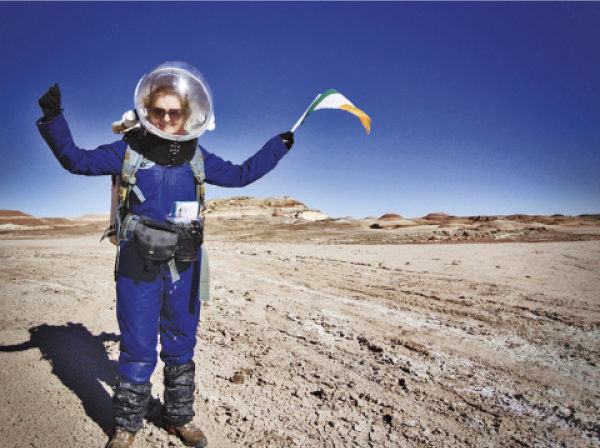
Photo:www.niamhshaw.ie
Dermot Carmody
Dr Niamh Shaw will give a “talk for grown ups” on beekeeping and bees’ importance in the ecosystem at The Ark in Eustace Street on November 17th. The event is part of Science Week, which runs from the 10th-17th of November. This year it will focus on “climate action, seeking to help people understand climate change, how science and technology can help us create a positive climate future and the impact we as individuals can have on climate change.”
NewsFour sat down for a conversation with Dr. Shaw about life, bees and space. She’s the very definition of a renaissance woman, holding two degrees in engineering and a Phd in science, boasting a wealth of experience in theatre and live speaking and holding the serious ambition to travel in space as a citizen and an artist.
And of course she has experience as a beekeeper, something she has learned from her father, who has been very involved in beekeeping for many years and who only recently retired as Secretary of the Federation of Irish Beekeepers Associations (FIBKA).
“I’m only three years keeping bees and most of the people involved in beekeeping are in their 70s plus, that’s the average age,” says Niamh. She’s noticed that since she has become more involved with the bees herself, suddenly she meets beekeepers all the time. “I’ve met two beekeepers this week alone. One, I was in Belfast and working with scientists. One of them was a beekeeper. Then on Wednesday night I was at an event and my friend who’s an engineer and her husband, who’s also an engineer ends up being a beekeeper. It’s like there’s a whole beekeeping underworld of Ireland!”
Until recently Niamh’s father kept his beehives in his back garden, with Niamh travelling home to Louth to help out whenever her hectic schedule allowed. Then her father retired as secretary of FIBKA and found that back trouble made lifting the hives difficult, so they decided to move their bees to the Louth Beekeepers’ apiary.
Niamh takes up a story of bee discontent, which illustrates the way that the whole hive acts out the mood of its queen. “Within a matter of days,” she says, “the bees got really aggressive. At this stage the bees would know dad well enough that he doesn’t need to wear gloves. He doesn’t wear boots or anything.”
Niamh and her dad took the lid off their hive and almost immediately the bees started to attack them. “This was really scary – they were going crazy,” Niamh recalls. “We walked away and they followed us. It took them about twenty minutes to give up.”
Her father, stung, retreated to the safety of his car. Luckily Niamh was fully suited up and managed to get the angry beehive back in order. But the next time they returned to the hive the bees were really aggressive again.
Eventually, a beekeeping colleague told them they needed to replace the queen to solve the problem. A first attempt to do this failed to soothe the narky insects, so they tried again and “within a few days the whole hive calmed down. It’s incredible!”
Niamh is fascinated by the way a beehive acts as a mini society, with the queen at the centre dictating the mood and activity of the rest with her pheromones. That’s not always good news for the apian monarch. If the queen’s pheromones weaken, then the hive will decide it’s time to get shot of her and start again.
As Niamh explains, “when they know the queen is dying, they’ll just build up a new queen.” The bees will then literally push the old queen out to bring about regime change in the hive. There’s not much for her to look forward to in retirement: “They’ve fattened her up and she can’t actually move all that much because she eats royal jelly. She’s a prisoner!”
Although this seems a little rough on the deposed queen, Niamh is an enthusiastic admirer of what she calls a “perfect society” and its extraordinary organisation and self-regulation. There’s an organised structure of roles within the hive. Each bee once she hatches will go through a sequence of those roles.
Newly-hatched bees start keeping the floor of the hive clean as sweepers, others take care of the eggs and some fan air through the hive from the entrance with their wings to keep it ventilated. The final job in the sequence is that of the foragers, the bees who fly out to search for food.
All these working bees are female. It’s only when a new queen has to mate that the male drone is required. Apart from that function drones are, as Niamh says, “a waste of space.”
This can cause problems if the hive loses its queen. If that happens, “the other bees panic and they start to lay eggs and all the eggs that hatch are drones, they’re all male bees. Drones don’t do anything, drones just hang out, chill , eat, do nothing so they’re a waste of space, like all men are!”
Honey bees of the type used to produce honey commercially are only a small part of our bee population. There are around a hundred different species of bee in Ireland including the native Irish bee, apis millifera millifera, which is a black bee, and all the various solitary bees and bumblebees.
Different species are attracted to different plants, so the diversity of the bee population and the plant population are inextricably linked. Niamh stresses the importance of preserving the hedgerows in Ireland as they are the environment where this biodiversity can flourish.
Honey bees act as pollinators for many fruit trees, something which has led farmers to become aware of the importance of the bee population, and to seek to make use of them to increase their yield.
One beekeeper friend of Niamh’s was approached by an apple farmer to introduce his bees to the farmer’s orchard. There was a 20% improvement in the fruit yield as a result in this instance.
The artificial introduction of bee populations to certain areas to improve yields is not without problems, as Niamh explains. “In America,” she says, for example, “almond trees need to be pollinated so they hire beekeepers from Montana, California, Carolina and so on. The problem with that is that if there’s a plague in Montana, now it’s going to be transferred to Carolina so you’ve got a serious problem of cross-contamination. There are different types of pests that bees have and so you’re exacerbating the problem for them. When you aggressively farm something like that as well it’s not good for nature.”
She also points out that there’s an ethical concern in the way we treat bees. Moving them hundreds of miles in lorries must be stressful for them, she thinks, going so far as to describe it as a type of slavery.
She believes the way we treat bees is a reflection of us as a culture, which is why she combined beekeeping and her passion for the idea of human space travel in her last theatre show, Diary Of A Martian Beekeeper.
In all her work Niamh is motivated by the importance of informing people about technology, what it can do and the issues for us regarding what we think we should do. “I want people to ask about asteroid mining and colonisation of Mars,” she says, because “the sooner we get laws and policies in place to protect the impact of us as a species who are essentially a parasite on one planet affecting another planet, the better.”
Although she’s optimistic about technology and our future, Niamh’s mission is partly to give others an informed perspective of humans in the universe, because, as she says “whether we exist or not, our planet continues to revolve around its axis and continues to orbit the sun, it doesn’t give a damn whether we know or not.”
Niamh Shaw’s talk on bees and beekeeping is at The Ark in 11A Eustace St, Temple Bar, at 6pm on November 14th.
More information and booking details are online at https://ark.ie/events/view/beekeeping
Find out more about Niamh at her website http://www.niamhshaw.ie



